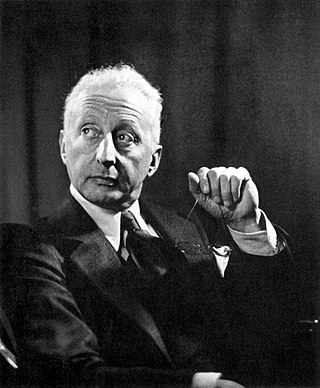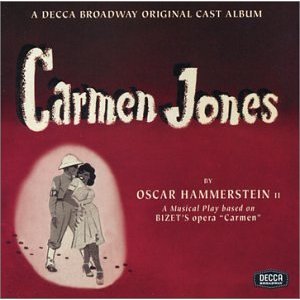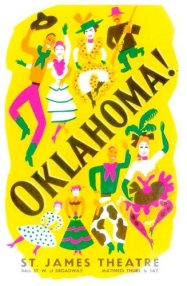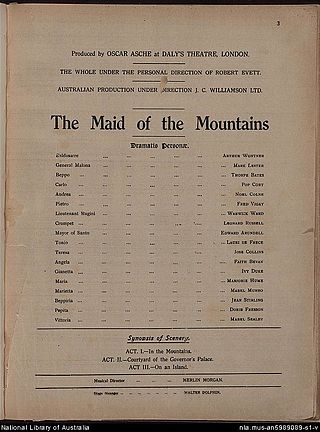Related Research Articles

Carousel is the second musical by the team of Richard Rodgers (music) and Oscar Hammerstein II. The 1945 work was adapted from Ferenc Molnár's 1909 play Liliom, transplanting its Budapest setting to the Maine coastline. The story revolves around carousel barker Billy Bigelow, whose romance with millworker Julie Jordan comes at the price of both their jobs. He participates in a robbery to provide for Julie and their unborn child; after it goes tragically wrong, he is given a chance to make things right. A secondary plot line deals with millworker Carrie Pipperidge and her romance with ambitious fisherman Enoch Snow. The show includes the well-known songs "If I Loved You", "June Is Bustin' Out All Over" and "You'll Never Walk Alone". Richard Rodgers later wrote that Carousel was his favorite of all his musicals.

Jerome David Kern was an American composer of musical theatre and popular music. One of the most important American theatre composers of the early 20th century, he wrote more than 700 songs, used in over 100 stage works, including such classics as "Ol' Man River", "Can't Help Lovin' Dat Man", "A Fine Romance", "Smoke Gets in Your Eyes", "The Song Is You", "All the Things You Are", "The Way You Look Tonight" and "Long Ago ". He collaborated with many of the leading librettists and lyricists of his era, including George Grossmith Jr., Guy Bolton, P. G. Wodehouse, Otto Harbach, Oscar Hammerstein II, Dorothy Fields, Johnny Mercer, Ira Gershwin and Yip Harburg.

Musical theatre is a form of theatrical performance that combines songs, spoken dialogue, acting and dance. The story and emotional content of a musical – humor, pathos, love, anger – are communicated through words, music, movement and technical aspects of the entertainment as an integrated whole. Although musical theatre overlaps with other theatrical forms like opera and dance, it may be distinguished by the equal importance given to the music as compared with the dialogue, movement and other elements. Since the early 20th century, musical theatre stage works have generally been called, simply, musicals.

Oscar Greeley Clendenning Hammerstein II was an American lyricist, librettist, theatrical producer, and director in musical theater for nearly 40 years. He won eight Tony Awards and two Academy Awards for Best Original Song. Many of his songs are standard repertoire for vocalists and jazz musicians. He co-wrote 850 songs.

Richard Charles Rodgers was an American composer who worked primarily in musical theater. With 43 Broadway musicals and over 900 songs to his credit, Rodgers was one of the most well-known American composers of the 20th century, and his compositions had a significant influence on popular music.

The King and I is the fifth musical by the team of Rodgers and Hammerstein. It is based on Margaret Landon's novel Anna and the King of Siam (1944), which is in turn derived from the memoirs of Anna Leonowens, governess to the children of King Mongkut of Siam in the early 1860s. The musical's plot relates the experiences of Anna, a British schoolteacher who is hired as part of the King's drive to modernize his country. The relationship between the King and Anna is marked by conflict through much of the piece, as well as by a love to which neither can admit. The musical premiered on March 29, 1951, at Broadway's St. James Theatre. It ran for nearly three years, making it the fourth-longest-running Broadway musical in history at the time, and has had many tours and revivals.

Carmen Jones is a 1943 Broadway musical with music by Georges Bizet and lyrics and book by Oscar Hammerstein II which was performed at The Broadway Theatre. Conceptually, it is Bizet's opera Carmen updated to a World War II-era, African-American setting. Bizet's opera was, in turn, based on the 1846 novella by Prosper Mérimée. The Broadway musical was produced by Billy Rose, using an all-black cast, and directed by Hassard Short. Robert Shaw prepared the choral portions of the show.

Oklahoma! is the first musical written by the duo of Rodgers and Hammerstein. The musical is based on Lynn Riggs's 1931 play, Green Grow the Lilacs. Set in farm country outside the town of Claremore, Indian Territory, in 1906, it tells the story of farm girl Laurey Williams and her courtship by two rival suitors, cowboy Curly McLain and the sinister and frightening farmhand Jud Fry. A secondary romance concerns cowboy Will Parker and his flirtatious fiancée, Ado Annie.

Rodgers and Hammerstein was a theater-writing team of composer Richard Rodgers (1902–1979) and lyricist-dramatist Oscar Hammerstein II (1895–1960), who together created a series of innovative and influential American musicals. Their musical theater writing partnership has been called the greatest of the 20th century.

Flower Drum Song was the eighth musical by the team of Rodgers and Hammerstein. It is based on the 1957 novel, The Flower Drum Song, by Chinese-American author C. Y. Lee. It premiered on Broadway in 1958 and was then performed in the West End and on tour. It was adapted for a 1961 musical film.

The Maid of the Mountains, called in its original score a musical play, is an operetta or "Edwardian" musical comedy in three acts. The music was by Harold Fraser-Simson, with additional music by James W. Tate, lyrics by Harry Graham and additional lyrics by Frank Clifford Harris and Valentine, and the book was written by Frederick Lonsdale, best known for his later society comedies such as On Approval. After an initial try-out at the Prince's Theatre in Manchester on 23 December 1916, the show was rewritten and opened at Daly's Theatre in London on 10 February 1917.

A Connecticut Yankee is a musical based on the 1889 novel A Connecticut Yankee in King Arthur's Court by American writer Mark Twain. Like most adaptations of the Twain novel, it focuses on the lighter aspects of the story. The music was written by Richard Rodgers, the lyrics by Lorenz Hart, and the book by Herbert Fields. It was produced by Lew Fields and Lyle D. Andrews. It enjoyed an original run on Broadway in 1927 of 421 performances and a number of revivals.

The Geisha, a story of a tea house is an Edwardian musical comedy in two acts. The score was composed by Sidney Jones to a libretto by Owen Hall, with lyrics by Harry Greenbank. Additional songs were written by Lionel Monckton and James Philp.

Chu Chin Chow is a musical comedy written, produced and directed by Oscar Asche, with music by Frederic Norton, based on the story of Ali Baba and the 40 Thieves. The piece premièred at His Majesty's Theatre in London on 3 August 1916 and ran for five years and a total of 2,238 performances, a record that stood for nearly forty years until Salad Days. The show's first American production in New York, with additional lyrics by Arthur Anderson, played for 208 performances in 1917–1918, starring Tyrone Power. It subsequently had successful seasons elsewhere in America and Australia, including in 1919, 1920, 1921 and 1922.

John Stange(r) Heiss Oscar Asche, better known as Oscar Asche, was an Australian actor, director, and writer, best known for having written, directed, and acted in the record-breaking musical Chu Chin Chow, both on stage and film, and for acting in, directing, or producing many Shakespeare plays and successful musicals.

Allegro is a musical by Richard Rodgers (music) and Oscar Hammerstein II, their third collaboration for the stage. Opening on Broadway on October 10, 1947, the musical centers on the life of Joseph Taylor Jr., who follows in the footsteps of his father as a doctor, but is tempted by fortune and fame at a big-city hospital.

The Boy is a musical comedy with a book by Fred Thompson and Percy Greenbank, music by Lionel Monckton and Howard Talbot and lyrics by Greenbank and Adrian Ross. The original production opened at the Adelphi Theatre in London in 1917 and ran for 801 performances – one of the longest runs of any musical theatre piece up to that time. It had successful foreign productions and tours.

Edwardian musical comedy is a genre of British musical theatre that thrived from 1892 into the 1920s, extending beyond the reign of King Edward VII in both directions. It began to dominate the English musical stage, and even the American musical theatre, when the Gilbert and Sullivan operas' dominance had ended, until the rise of American musicals by Jerome Kern, Rodgers and Hart, George Gershwin and Cole Porter following the First World War.

Development of musical theatre refers to the historical development of theatrical performance combined with music that culminated in the integrated form of modern musical theatre that combines songs, spoken dialogue, acting and dance. Although music has been a part of dramatic presentations since ancient times, modern Western musical theatre developed from several lines of antecedents that evolved over several centuries through the 18th century when the Ballad Opera and pantomime emerged in England and its colonies as the most popular forms of musical entertainment.

Runs of several thousand performances were familiar in West End theatres in the 21st century. The closure of London theatres in the Covid-19 pandemic halted the continuous runs of eight shows that had been running for more than 4,000 performances. Such long runs were a phenomenon not seen before the late 20th century: in earlier years, much shorter runs were the norm, even for shows considered great successes.